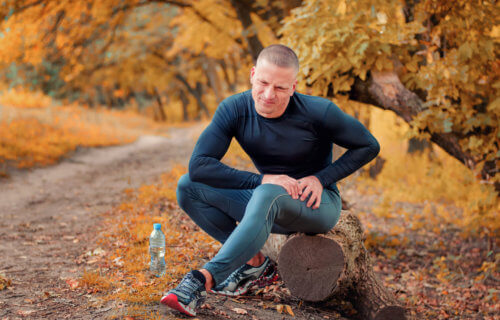PERTH, Western Australia — Staying hydrated during exercise is critical for peak performance. We’re constantly told to take sips of water while we work out, but when it comes to muscle cramps, electrolytic drinks take the cake! According to a recent study, those who drink water containing electrolytes are less likely to develop muscle cramps after a workout.
When it comes to marathoners, approximately 39% of runners and 60% of bicyclists are affected by muscle cramps. Researchers from Edith Cowan University in Australia studied the effects of electrolytes on individuals in order to determine whether insufficient water or electrolytes are more likely to cause muscles to cramp.
“Many people think dehydration causes muscle cramps and will drink pure water while exercising to prevent cramping,” says lead researcher, professor Ken Nosaka, from the university’s School of Medical and Health Sciences, in a statement. “We found that people who solely drink plain water before and after exercise could in fact be making them more prone to cramps. This is likely because pure water dilutes the electrolyte concentration in our bodies and doesn’t replace what is lost during sweating.”
Having endured frequent cramps while playing tennis, Nosaka decided to investigate the origin behind them. For the investigation, 10 men ran for 40 minutes to 1 hour on a treadmill. Researchers set the temperature of the space to 95℉ to induce perspiration. The aim was for the participants to reduce their overall body weight by 1.5-2.0%.
All participants drank water during and post-exercise, however, one group was given electrolytic water and the other was given water without electrolytes. After physical activity, the subjects’ calves were electrically stimulated to cause muscular cramps. The higher the intensity of electrical stimulation needed, the less likely the person may experience muscular cramping.
“We found that the electrical frequency required to induce cramp increased when people drank the electrolyte water but decreased when they consumed plain water,” says Nosaka. “This indicates that muscles become more prone to cramp by drinking plain water, but more immune to muscle cramp by drinking the electrolyte water.”
Minerals such as magnesium, sodium, chloride, and potassium serve as electrolytes in the body. Because of their role in promoting hydration and muscular health, they are beneficial to both athletes and non-athletes. Electrolytes are present in specified amounts in certain drinks such as Pedialyte and Gatorade, therefore, they can be bought at drugstores and grocery stores alike.
“Electrolytes are vital to good health – they help the body to absorb water more effectively than plain water and replace essential minerals lost through sweat or illness. People should consider drinking oral rehydration fluids instead of plain water during moderate to intense exercise, when it’s very hot, or when you are sick from diarrhea or vomiting,” said Professor Nosaka.
Nosaka intends to do more investigation to assess the ideal quantity of electrolytes necessary to avoid muscular cramps. Additionally, he plans to determine the possible benefits of electrolytes for elderly individuals as well as women who are pregnant.
This study is published in the Journal of the International Society of Sports Nutrition.

Sorry, for sounding snide, but having been in sport during the first generation of Gatoraid and Quick Kick, when the electrolyte drinks were invented to prevent the mineral and fluid loss that led to serious heat prostration and were proven to do so both by independent research and “clinical experience” use on sidelines world wide; now 50+ years later I have to wonder why anyone doubted their effectiveness enough to need to do yet another study to “further prove” their effectiveness. Human physiology hasn’t changed since 1968.